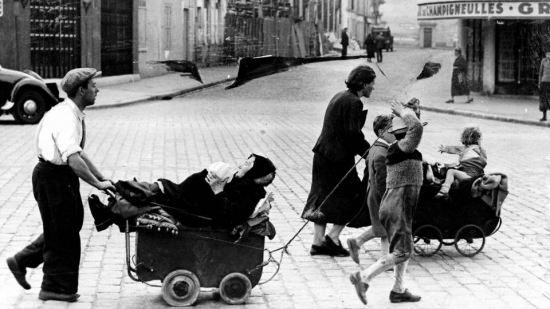Wars and books
The Great War inspired a number of books, from Henri Barbusse’s novels (Le Feu), Roland Dorgelès’ Les Croix de bois (Wooden Crosses), to Voyage au bout de la nuit (Journey to the End of the Night), by Louis -Ferdinand Céline, just to name a few. It inspired also memoirs like Kolibek: Ardengo Soffici’s battle newspaper (1918) or even Carlo Emilio Gadda’s War and Prison Journal.
We must also not forget, on the German front, Im Westen nicht Neues (Nothing new on the Western front) by Erich Maria Remarque, Stahlgewittern (In Storms of Steel) by Ernst Jünger, and an enormous amount of memoirs and newspapers written by soldiers and officers who took part in that conflict.
France in 1939-1940
As regards France, the period 1939-1940, named “drôle de guerre” (the strange war), inspired fewer writings. One can think of Les Décombres (The rubble) by Lucien Rebatet (1942), which at the time had a huge success, and of Un balcon en forêt (A balcony in the forest) by Julien Gracq (1958). It is worth mentioning once again Claude Simon’s Route des Flandres (The Road to Flanders) published in 1960 and Robert Merle’s Weekend à Zuydcoote (Weekend a Zuydcoote) (1958), out of which two films have been made, the first shot by Henri Verneuil in 1964 , recalling the Dunkirk.
Suite française, a memorable novel
There are fewer books of memories of the fighting (but there is the one written by my father, Georges Kosasz, who narrates “his” campaign in Belgium with tanks). On the consequences of the sad battle of France, there is only one but memorable book: Suite française by Irène Némirovsky (1903-1942, who died during her deportation), which came out only in 2004 and which posthumously received the Goncourt prize. Irène made a fierce and at the same time very precise description of the gigantic exodus caused by the rapid advance of the German armies that created enormous chaos on the country’s roads and caused the death of about 100,000 civilians due to air strikes.
The essay by Jean-Louis Crémieux-Brilhace
The impressive two-volume essay by Jean-Louis Crémieux-Brilhace, Folio Histoire is the first book that allows us to discover all the issues, debates and opinions before and during the war, the reasons for the defeat and also the social political, ideological conditions, that were at the origin of that situation. He examines in details the debates within Paul Reynaud‘s government, in which there was no agreement between the more or less pro-war and the pacifists at any cost. The essay also explains the views of that and of the previous government on the issue of the civil war in Spain, of the Anschluss, of the Munich accords on the Sudetenland. Furthermore, it analyses the entry of the Nazi troops into Prague, the problem of the corridor of Danzig and the invasion of Poland which led to the declaration of war by the United Kingdom and France. It makes it clear what public opinion, the press, parliamentarians, senators of the opposition and the main party leaders thought. There is also the unexpected German-Soviet pact to take into consideration (it should be remembered that France at the time had an alliance treaty with the Soviet Union). The French Communist Party was outlawed like all its publications. These events added more confusion.
A puzzle of contradictions
The author was able to carefully put together a complex puzzle, full of contradictions and errors, but also with some right decisions, such as the rearmament of the French army and the renewal of the aviation. But there was the problem of Gamelin, Minister of War, one of the most important figures of the First World War. He was, like Pétain, a partisan of a defensive system, starting with the example of the victorious battle of Verdun. The Maginot Line was an ultra-modern and well-equipped fortress along the border with Germany. But it ended at the borders of Belgium, a friendly country. The Germans chose a daring plan: to go through the Netherlands and Belgium exactly as in 1914. The French and British armies came to the small country to help it. Unfortunately, in the meantime, the German panzer divisions have passed from the Ardennes, which were wrongly considered impassable for the tanks. They went so fast that they found themselves in a huge traffic jam for two days. If the French High Command had known, it could have crushed the enemy offensive. But nothing happened. In short, the Allies found themselves encircled and had to flow back to the port of Dunkirk.
France almost in disarray
There, all of a sudden, the German offensive stopped. Hitler allowed the British, (and with them a considerable number of French soldiers), to return without too much difficulty across the Channel. Hitler probably thought he could negotiate with the British and maybe sign a separate peace treaty. It was the first of his mistakes. Despite this, for three weeks France was almost in disarray. Paris was declared an open city and the government took refuge in Bordeaux. Some members of the government wanted to recompose the army behind the Loire, or transfer the government to Algiers. But Paul Reynaud was unable to make strong decisions. Moreover, he had chosen Philippe Pétain as Minister of War, who was the worst enemy of the Republic! The young General De Gaulle was Secretary of State in this latest government and had proposed turning Britain into a fortress. He was not heard. Time was pressing. Reynaud left his place to Pétain. The latter immediately proposed an armistice which was signed on June 22, 1940 in Rethondes, in the forest of Compiègne (the armistice of 1918 was also signed there). Charles De Gaulle left for London and delivered his famous speech the next day. Pétain met Hitler on October 24 in Montoire, after the vote of the chambers that had abolished both the republic and the parliamentarism entrusting him with full powers. It was the beginning of collaborationism.
With Les Français del’An 40 (The French of 1940), Jean-Louis Crémieux-Brilhac wrote the pages that were missing from the French history of the twentieth-century, pages that are not very glorious, but necessary to understand why the collapse of an European power was so fast and tragic. It will be for a long time the reference book for this period which still remains difficult to interpret and accept.








